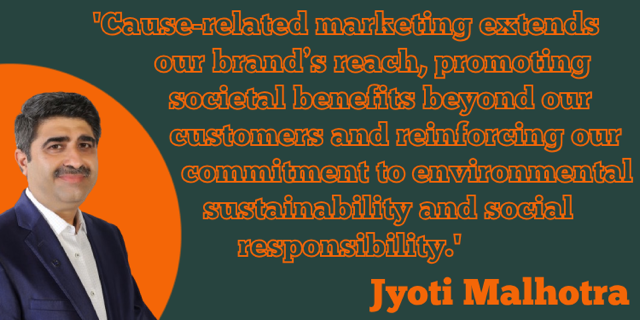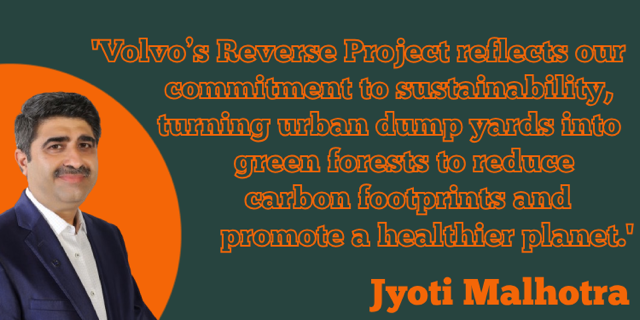Volvo Car India recently launched a Cause Marketing Initiative ‘The Reverse Project’, turning kilometres into trees.
With this initiative Volvo explains that it plans to start a movement in which individuals/organisations/automobile manufacturers and their customers across the country can participate and contribute towards reversing the damage done to the Earth.
Volvo Car India has set an ambitious goal to achieve 100% sustainability by 2040. As a crucial part of this mission, Volvo has launched The Reverse Project. As an initial initiative, the company has joined forces with Assocham in planting 10,000 trees thereby converting an urban dump yard in Ghaziabad, Uttar Pradesh into a lush green urban forest.
Currently, Volvo has planted five trees for each of its Electric Vehicle (EV) sold to date as well as four trees for other EV owners who may wish to be associated with the Reverse Project. Once associated with the project, EV owners of other brands can have trees named after them, commensurate to the mileage they have done on their EVs. As an EV owner, four trees will be named after you for every 5000 km driven. Additionally, non-EV owners can also pledge and join this initiative. This approach not only underscores Volvo’s dedication to sustainability but also signifies a meaningful step towards a greener and healthier future.
Over the next four years, Volvo will look to maintain and nurture the urban forest created through this project. This efforts have turned a major environmental threat into a lush green space, providing a vital green lung for the city.
The Reverse Project has aligned with Volvo Car India’s broader goal of promoting a sustainable planet and achieving net carbon neutrality by 2040. This initiative extended beyond the cars, transforming urban dump yards into flourishing urban forests.
Medianews4u.com caught up with Jyoti Malhotra, Managing Director, Volvo Car India
Q. How did the idea of The Reverse Project come about?
The idea for Volvo Cars’ Reverse Project was inspired by our unwavering commitment to sustainability and our vision of creating a safer, greener future. This project is a testament to our dedication to environmental stewardship and aligns perfectly with our brand’s mission and values. By transforming urban dump yards into green urban forests, we aim to reverse our carbon footprint and foster a healthier planet. The Reverse Project is an integral part of our goal to achieve 100% sustainability by 2040, underscoring our values of innovation, environmental care, and proactive stewardship of natural resources. Through this transformative initiative, Volvo Car India not only reinforces its commitment to sustainable practices but also inspires communities to join in the effort to combat environmental degradation and promote a greener future.

Q. What are its various touchpoints?
First and foremost the touch point is the community that gets the benefit of reforestation. The next touchpoint, which is actually the most critical touchpoint in the Reverse Project are our existing EV customers on whose behalf we have planted five trees for every EV we have sold. The next touch point is the owner of any other car who wishes to pledge to reverse the damage to the environment. However, if we were to analyse the Reverse Project’s touch points from a campaign perspective, then it would cover the entire gamut of communications… the organic media, the digital media, influencer interaction, employee and channel partners.
Q. What role does Cause Marketing play in the company’s overall marketing mix?
Cause Related Marketing is an extended arm of brand marketing where we take up a cause that benefits society at large. As such our endeavour is to go beyond our customer base and reach out to all car owners, irrespective of the fuel used or the brand, to help communities protect the environment. Through this approach, we not only promote our brand values but also contribute positively to society, reinforcing our commitment to sustainability and social responsibility.
Q. What other initiatives will Volvo do to increase its share of voice in 2024?
Our strategy is to be present on all platforms and thereby increase our share of voice and in this, we are going beyond the legacy platforms. We are focussing on digital marketing, content creation, influencer marketing and always-on digital.
Additionally, our robust public relations efforts will ensure consistency. We are leveraging our leadership’s industry and thought leadership position via speaker opportunities at events that even go beyond the auto sector thereby highlighting our brand’s values and achievements to a larger audience.

Q. What will the media mix look like for Volvo in 2024? Will there be any change compared to 2023
We continue to invest in select media vehicles sharp targeting our audience and relevant branding opportunities. The media mix is largely digital, supported by on-ground activation, vantage point branding, etc. Compared to 2023, we have further fine-tuned our approach to ensure precise and focused targeting and engagement with our audience.
Q. Last year the company launched a For Life platform. How will that be expanded upon this year?
The Volvo For Life Fund, launched last year, demonstrates our steadfast dedication to safety that goes beyond our cars and extends to environmental and community restoration efforts. We are expanding this initiative to engage communities and ecosystems globally through biodiversity conservation, carbon neutrality, education, and the enhancement of local livelihoods.
Under this initiative, we are committed to planting 550,000 trees across seven countries on five continents, supporting eight rural and urban projects. Our efforts include restoring Brazil’s Atlantic Forest, revitalizing Denmark’s landscapes, and fostering community development in Punjab. These initiatives highlight Volvo’s commitment to environmental sustainability and community empowerment.
Additionally, the Reverse Project is an extension of the Volvo For Life Fund. By converting urban dump yards into green urban forests, we aim to reduce our carbon footprint and promote a healthier planet. This project is crucial to our goal of achieving 100% carbon neutrality by 2040, reflecting our values of innovation, environmental care, and proactive natural resource stewardship.

Q. A few years back Volvo had targeted women with the Make Your City Safe campaign. Are women an important TG?
At Volvo Car India, our commitment to safety transcends conventional boundaries, reflecting our long-standing dedication to protecting all individuals on the road. Since the 1950s, we have analysed over 43,000 real-life accidents involving 72,000 occupants, leading to groundbreaking innovations in automotive safety.
Women have been a crucial focus for us, especially given that traditional crash test standards have often been male-centric. In response, Volvo initiated the E.V.A. (Equal Vehicles for All) Initiative to address this disparity. Our research, spanning over 40 years, underscores the need for safety systems that cater to every individual, regardless of gender. By leveraging comprehensive real-world data, we identify and address injury patterns specific to men, women, and children.
Our pioneering advancements include the Whiplash Protection System (WHIPS), which has effectively equalised whiplash risks between genders, and the Inflatable Curtain airbag, which provides essential protection for women in side-impact collisions. Additionally, our safety belt technology has saved over a million lives and is designed to protect all occupants, including pregnant women, through innovations like the world’s first average-sized pregnant crash test dummy.
At Volvo, we believe that road safety should be universally inclusive. Through continuous research and innovation, we are committed to ensuring that our vehicles offer optimal protection for every occupant, reinforcing our dedication to safety for all.

















